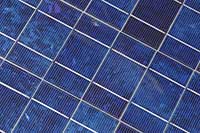Jan 22 2008
AOS Solar is developing Solar Silicon 4.0 technology that combines crystalline silicon (c-Si) photovoltaic (PV) efficiency with low cost, high throughput thin film manufacturing economics.
 Detail of a solar cell
Detail of a solar cell
AOS Solar's mission is to achieve c-Si efficiencies while reducing the amount of required silicon by 90%, the manufacturing energy budget required to achieve each Watt peak of output by 50%, and the capital equipment required by 50%. This combination of c-Si PV efficiency with thin film manufacturing economics will be presented for the first time at the www.ibfconferences.com nanotechnology investment forum in Palm Springs, February 6.
CEO Anikara Rangappan explains, "If we had to invent solar panels today we would certainly use silicon because that is a very well known material with a proven field life of 20+ years in solar PV applications. But we would not pull ingots, saw 6" diameter wafers, and wire them together to manufacture a solar PV module. Current high efficiency silicon solar cells have a very high materials cost and the manufacturing cost for both cells and modules is too high. We think research has shown us a better way and we are on the path to solve the volume manufacturing challenges."
This patented Clean Energy technology uses proprietary manufacturing processes to significantly reduce the materials cost, energy budget, and capital expenses required for large scale, high efficiency Si PV module manufacturing.